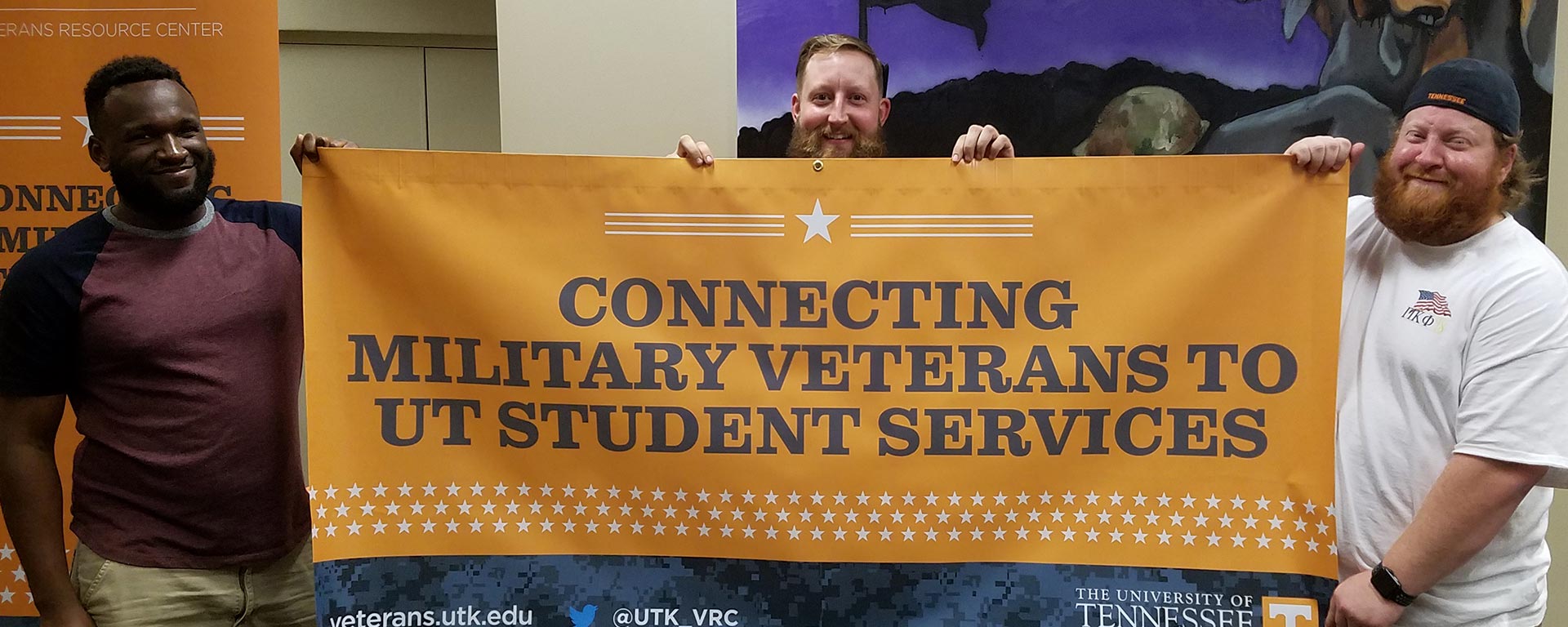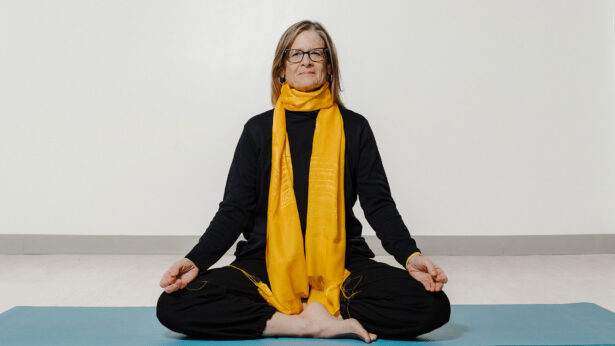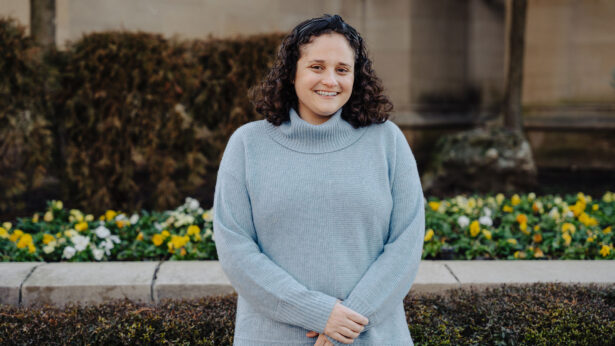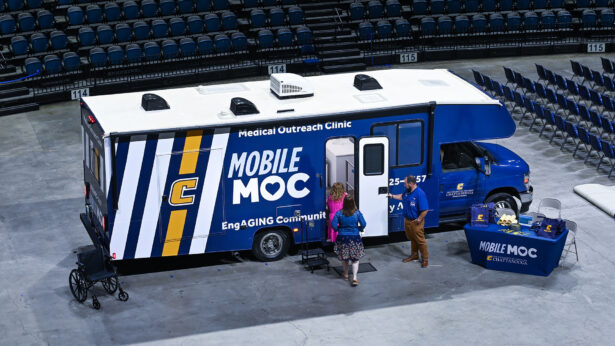Navy veteran Pandora Moss was ready to leave UT Knoxville almost immediately after she arrived.
“I didn’t realize how tough the transition would be until I did it,” Moss says. “Nothing was happening for me as fast as I wanted it to, so I’m thinking ‘I came here. I tried it. It’s time for me to go.’”
Moss had become accustomed to the fast-paced nature of the military and hadn’t yet found activities to dedicate her time to on campus. But, thanks to the resources on campus and encouragement from the Veterans Success Center (VSC), Moss gave UTK and higher education another try.
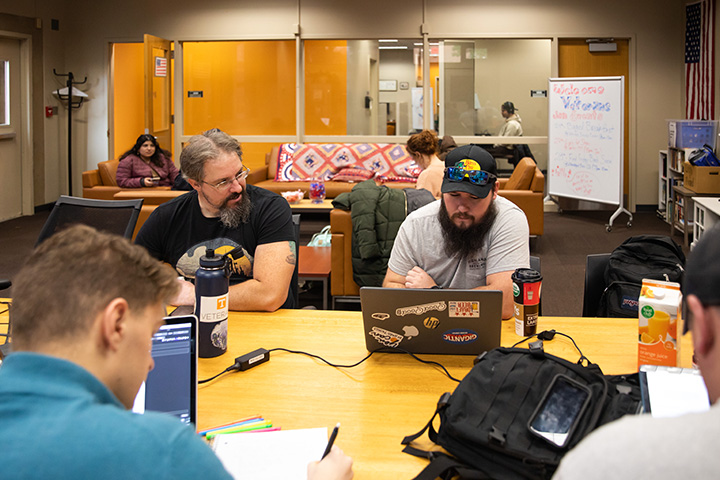
Each campus works to help its student veterans, who create a unique and diverse subgroup, navigate benefits, locate preschools, improve mental health or adjust to a lack of structure.
“That encouragement and decision really changed the direction of where my life is right now,” says Moss. “Once I got involved, my whole narrative changed.”
Moss has since worked as a peer mentor in the VSC Veteran Impact Program, UT’s first student veteran orientation leader and an intern for Vice Provost of Student Success Amber Williams.
From specialized orientations and training programs for faculty and staff to the recent implementation of in-state tuition rates for all military-affiliated students, work across the system ensures that veterans find success and thrive.
BUILD A BRIDGE. WALK IT WITH THEM.
The student entered the office in tears. With no money left in the bank, he’s still waiting to hear from Veterans Affairs (VA) about his education benefits. He thinks he has to drop out of college.
The gap before him seems large, looming, uncrossable. He and other veterans need a bridge to help them cross from a military life to a higher education one.
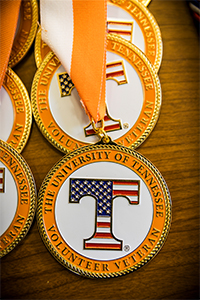
“We know that they don’t want to be felt sorry for,” says Thomas Cruise, the assistant director of UT Knoxville’s VSC. “There’s a sense of pride, a sense of, ‘I was in the military, so why can’t I do this?’”
The VSC does more than listen with an empathetic ear—it builds bridges over adjustment gaps.
“We try to ease some of that uncertainty and hesitation about, ‘Can I do this?’” says Cruise. “We come in and say, ‘Absolutely. This is how you’re going to do it, and this is how we’re going to support you.’”
That support comes from a multitude of resources and programming, such as the one-of-its-kind Veterans Impact Program, a one-semester cohort of student veterans that consolidates available resources, essential information and meaningful connections with peers to aid student veterans’ transition to higher education.
Veterans also find support in the VSC’s office lounge.
“If we can get them in the lounge, with a snack and a cup of coffee, making connections with others, that can make such a difference,” Cruise says. “In some cases, it can be the difference between life and death.”
In less than three years after the student came to him in tears, Cruise watched him graduate and find success post-college. Cruise knows he won’t be the last.
“When they’re on the edge, looking over that gap, thinking ‘Where do I go? What happens now?’ we can offer solutions and support,” Cruise says. “Building that bridge and crossing it with them makes a world of a difference.”
ADVOCATE FOR VETERANS. THEN, ADVOCATE HIGHER EDUCATION TO THEM.
In Fall 2022, UT System implemented in-state tuition rates for all veterans, active-duty, Guard, Reserve and ROTC members. The initiative opens more doors for veterans to attend a UT System institution and broaden their opportunities post-military.
The idea originated at UT Martin.
“The initiative takes care of our veterans and also makes our state more competitive,” says Jason Earley, UT Martin’s veteran services coordinator. “Our state is working every day to improve support for veterans.”
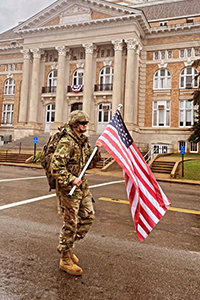
UT Martin is too.
From the Veterans Success Committee, composed of faculty and staff dedicated to ensuring student veteran success, to an annual Military Appreciation Week that celebrates veterans across the Martin community, Earley seeks ways to convey the importance of student veterans’ higher-education presence and vice versa.
“Sometimes these students will question the importance of completing their education, and I have to talk them through that,” Earley says. “I just want to help push them toward that degree because it’s going to make them more marketable in the future.”
VETERANS ENRICH THE CLASSROOM.
“There’s sometimes a narrative about veterans in higher education that they need intense and focused help,” says Cochran Pruett, UT Southern’s coordinator of veteran and military affairs and an instructor of social sciences. “I want to counter that narrative a little bit. Veterans bring a set of skills, knowledge and experiences to this space that’s very valuable, and they’re often markers for success.”
Pruett has experienced that added value in his classroom, when a student’s deployment travels supplement a history lesson on South Korea or basic training experiences exemplify psychology lessons on self-confidence and resilience.
Aside from VA educational benefits, many veterans’ services at UT Southern are in the developmental phase. Pruett is working to recruit more students to the recently established Student Veteran Organization and to facilitate constructive conversations about student veterans with other staff members and students.
“We strive to listen, and we look to build solid student veteran teams,” Pruett says. “We want veterans to feel like UT Southern can be a higher-education home for them.”
SUPPORT STUDENT VETERANS. BRING UNIQUE PERSPECTIVES.
Operating military aircraft and practicing medicine aren’t entirely unrelated, according to Phillip Crawford, a UT Health Science Center College of Medicine student and Navy veteran. Crawford’s past as a Navy pilot equips him with unique perspectives to bring to his future radiology career.
“There’s that 20 percent of being a pilot when something goes wrong in the aircraft, and it can’t tell you exactly what’s happening,” Crawford says. “To solve the problem, you have to understand the signs, systems and processes of the aircraft, just like a human body. There’s a parallel there to medicine, that skill set of real-time thinking and problem solving.”
While the veteran population at UTHSC is small, students like Crawford find a myriad of support from connections facilitated through military medicine interest groups to the Office of the Registrar’s Veteran Services assistance with VA educational benefit certifications.
In 2015, UTHSC received recognition as the first UT campus to receive the VETS Campus distinction from the Tennessee Higher Education Commission. The designation recognizes institutions that excel at facilitating veteran outreach, support and resources.
“As UTHSC fulfills its obligation to help veterans transition and succeed, we also embrace the responsibility to recognize and appreciate the depth of their commitment and service, and how our lives remain richer because of it,” Erica Fulton, the UTHSC Office of the Registrar’s lead VA
certifying official, says. “We want our veterans to feel welcomed and supported.”
MORE MILITARY-AFFILIATED STUDENTS, MORE CAMPUS DIVERSITY.
Veteran and military-affiliated individuals are often perceived as a monolith of backgrounds, experiences and beliefs. But that outlook remains untrue.
“All veterans are unique, and the population encompasses a wide range of personalities and perspectives,” says Robert Dorsett, UT Chattanooga’s associate director of Veteran and Military Affairs (VMA). “When you meet a veteran, you meet one veteran.”
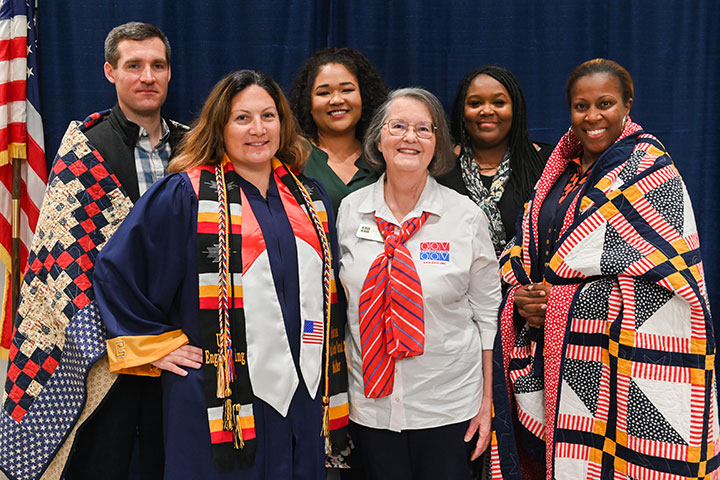
At UT Chattanooga, the team of four helps students navigate the often-difficult transition to higher education through a variety of programs and resources, including a veteran’s lounge, the Student Veteran Organization, VA education benefits assistance and the VMA Veteran Student Ambassadors program.
With access to VMA’s enriching and welcoming environment, student veterans involve themselves on campus. It’s noticeable when they are.
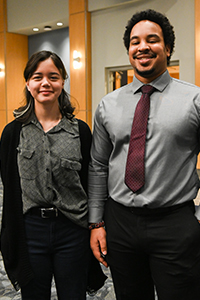
“They’re adding to the environment and the curriculum just by being there,” Director of Veteran and Military Affairs Sylvana Matthews says. “The more veterans we have, with their differences and diversity, the more other students will be able to learn and become open-minded.”
Army veteran and Student Veteran Organization President Ryan Chastain has noticed that effect in his own classes.
“I find myself giving advice to a lot of the younger students,” Chastain says. “And, because of our experiences and ages, we’re often more active participants in the classroom. That gives other students the courage or maybe sparks initiative to participate in the discussion and be active learners.”
